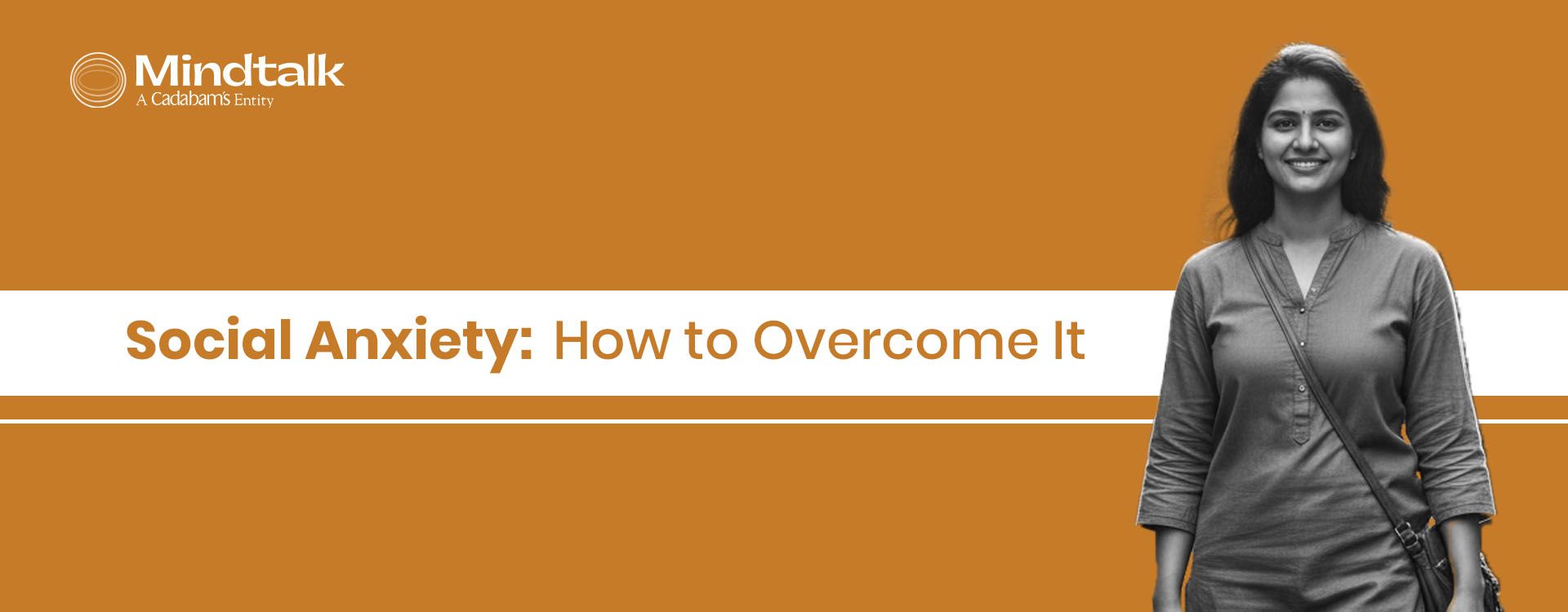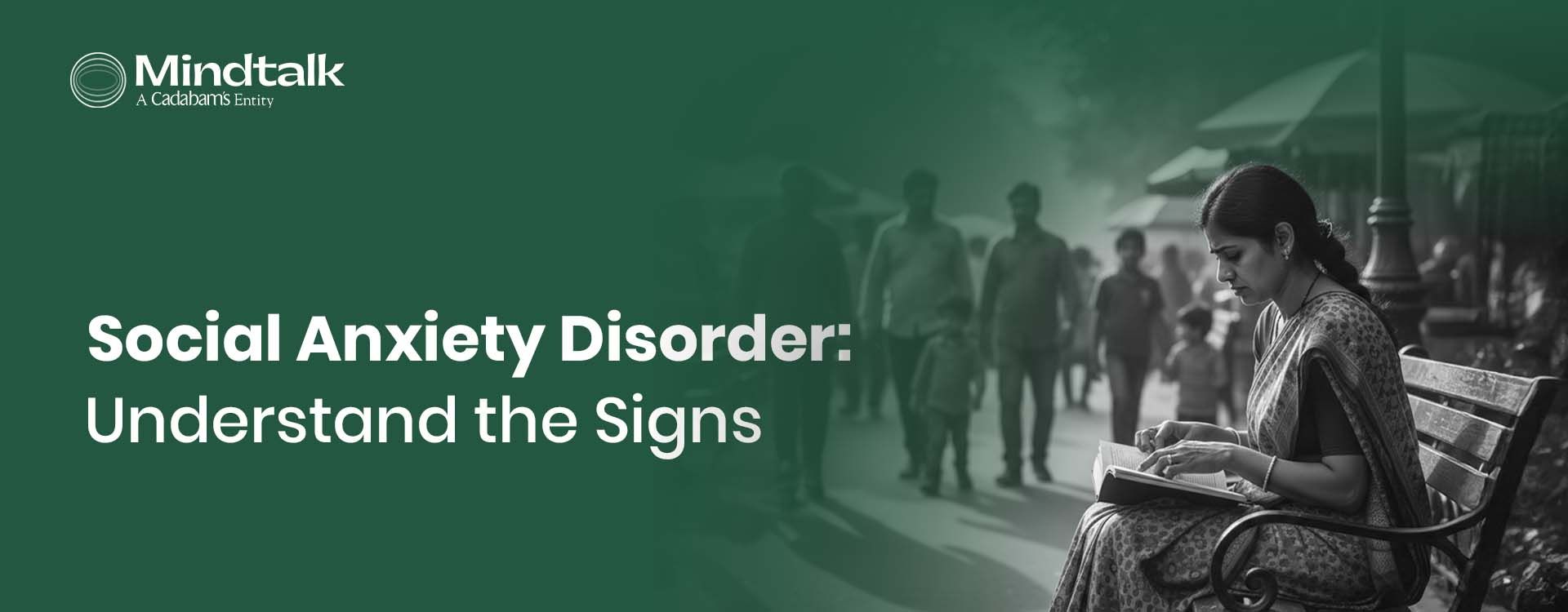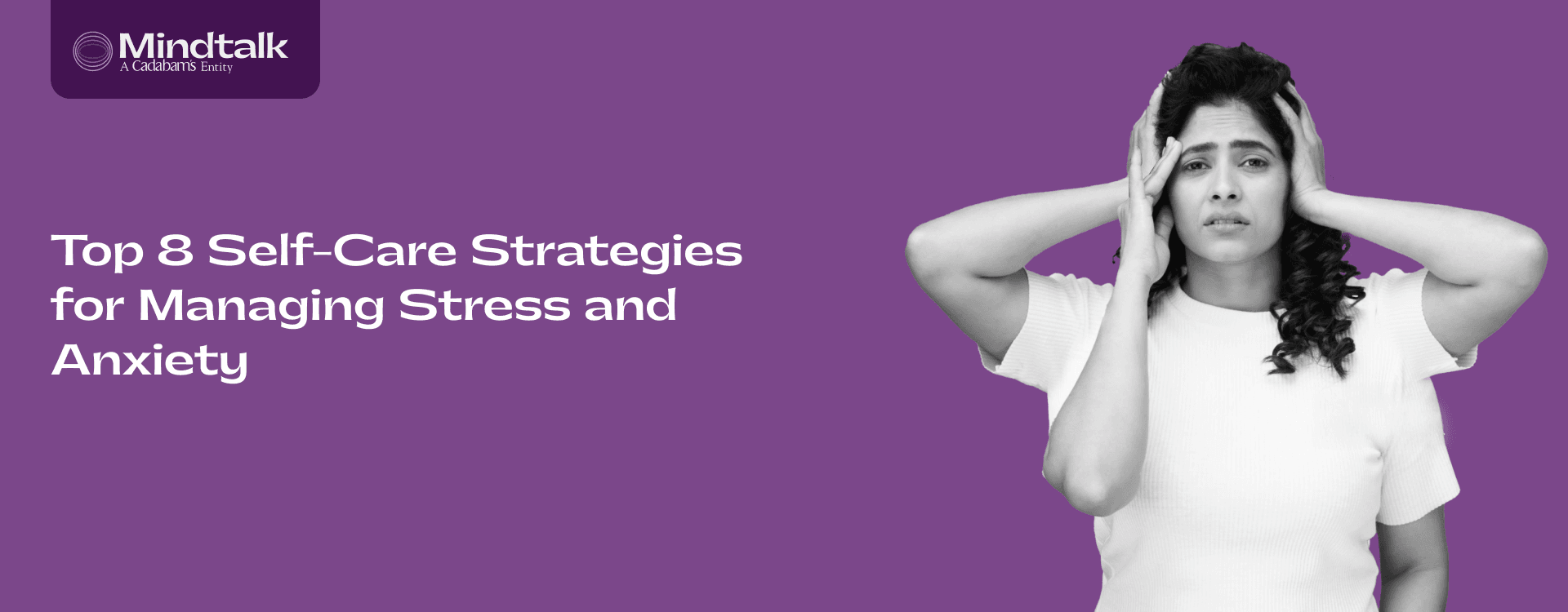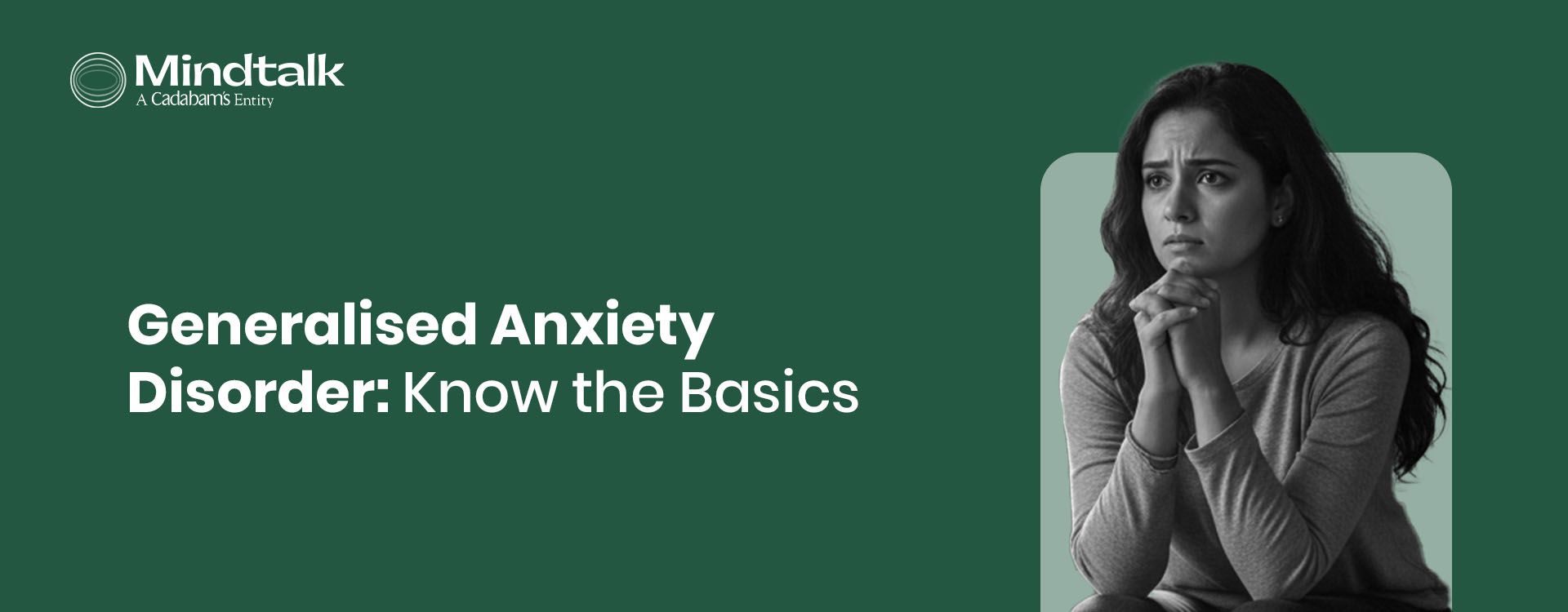Generalised Anxiety Disorder: Symptoms, Causes, and Treatments
Fear of an upcoming appointment or an important life event is completely natural — but what if this fear never goes away? For people with Generalised Anxiety Disorder (GAD), anxious thoughts don't just occur occasionally, they increase, escalate and disrupt daily functioning. It's not just about being nervous — it's that paralysing feeling of anxiety that won't let you go and makes even simple decisions seem intimidating. From insomnia and racing thoughts to physical fatigue, GAD affects your body and mind. If you know the signs, generalised anxiety disorder causes and generalised anxiety disorder treatment options, you can regain control and free yourself from the vicious cycle of anxiety.
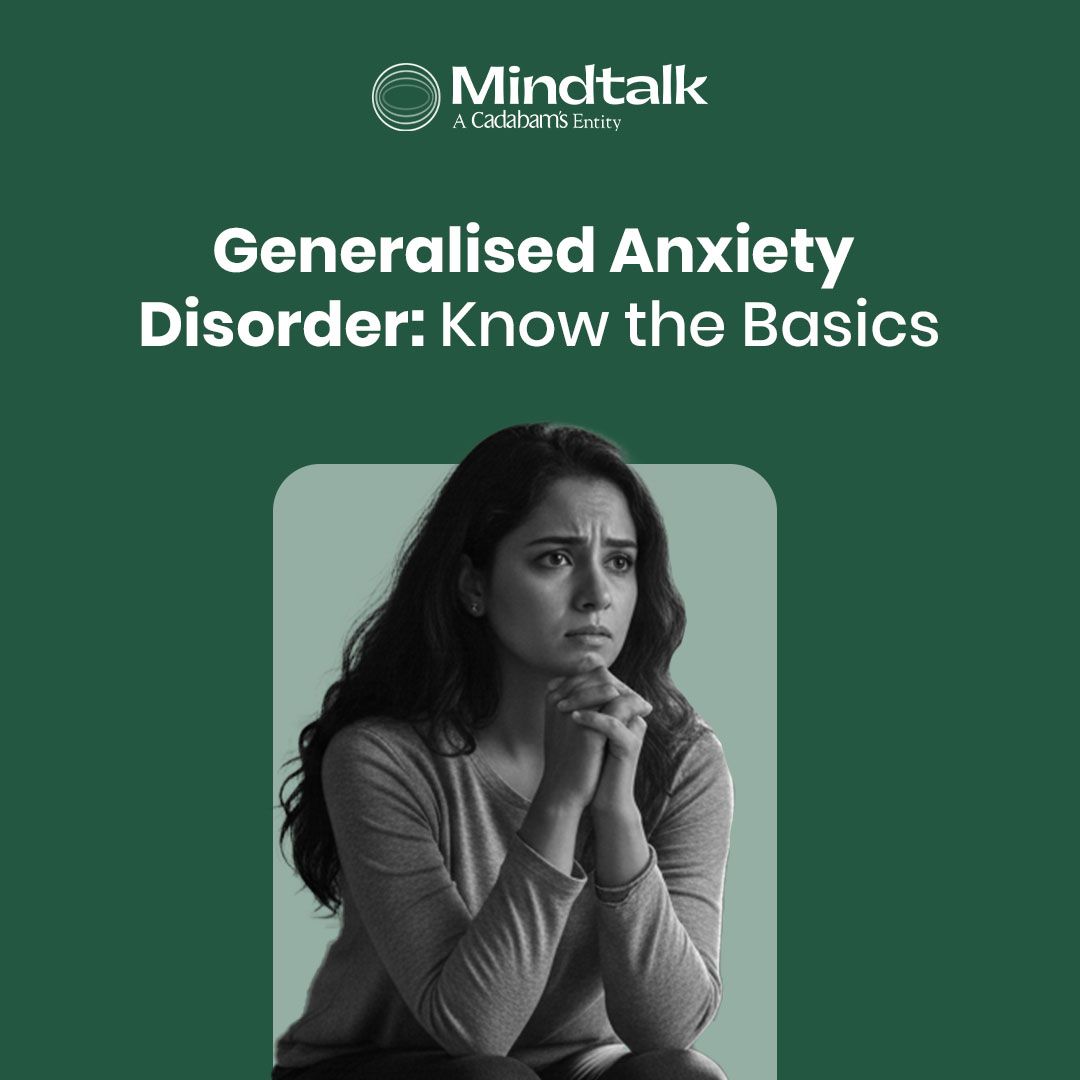
What Is Generalised Anxiety Disorder?
GAD is a chronic mental disorder characterised by an abnormal and excessive preoccupation with different areas of life, such as work, relations, health, and daily circumstances.
As opposed to typical stress, which arises from certain problems, GAD results in chronic worry even if no evident threat is present.
This condition can disrupt daily functioning, such that it is hard to concentrate, relax, or live life to the fullest.
Definition and Overview
Generalised Anxiety Disorder is classified as an anxiety disorder where excessive worry occurs more days than not for at least six months. This worry is often disproportionate to the situation and difficult to control.
Individuals with GAD may experience muscle tension, irritability, sleep disturbances, and difficulty concentrating.
The exact generalised anxiety disorder causes remains unclear, but a combination of genetic, environmental, and neurological factors contributes to its development.
Difference Between GAD and Panic Disorder
Although GAD and panic disorder both fall under the category of anxiety disorders, they differ significantly in symptoms and impact.
GAD involves persistent worry and anxiety, whereas panic disorder is characterised by sudden, intense episodes of fear known as panic attacks.
Panic disorder symptoms appear abruptly and peak within minutes, causing physical sensations such as chest pain, dizziness, and shortness of breath.
In contrast, GAD symptoms are more chronic and widespread, creating long-term distress.
Symptoms of Generalised Anxiety Disorder
Generalised anxiety disorder (GAD) symptoms extend beyond normal stress responses, impacting emotions, behaviour, physical health, and daily functioning.
Unlike occasional nervousness, GAD presents persistent and excessive worry that interferes with daily life.
Emotional Symptoms
Individuals with GAD experience persistent feelings of unease, excessive worry, and irrational fears that are difficult to control.
They often struggle with irritability, heightened nervousness, and a constant sense of impending doom, making it challenging to relax even in routine situations.
Behavioural Signs (Avoidance, Procrastination, Seeking Constant Reassurance)
People with GAD tend to avoid anxiety-inducing situations, leading to procrastination in tasks and decision-making.
They frequently seek reassurance from others, struggle with uncertainty, and may engage in safety behaviours, such as excessive planning, to reduce their distress.
Social & Occupational Impact (Interpersonal Struggles, Work Disruptions)
GAD can lead to difficulties in maintaining relationships and professional responsibilities.
Social interactions may feel overwhelming, leading to withdrawal or strained relationships.
Work productivity declines due to concentration issues, frequent worry, and fatigue, making it harder to meet deadlines or stay engaged.
Physical Symptoms
Chronic anxiety manifests physically, causing muscle tension, headaches, dizziness, and digestive issues.
Sleep disturbances, heart palpitations, and shortness of breath are common, mimicking medical conditions.
The body remains in a heightened state of alertness, leading to long-term exhaustion and weakened immune function.
Causes and Risk Factors
Generalised anxiety disorder causes(GAD) arises from a combination of biological, psychological, and environmental influences.
While some individuals inherit a genetic predisposition, others develop it due to life experiences, stress, or personality traits.
Understanding these risk factors is essential for early intervention and effective generalised anxiety disorder treatment strategies.
Genetic Factors & Family History
Individuals with a family history of anxiety disorders are more likely to develop GAD. Research suggests that genetic predisposition plays a role in how the brain processes fear and stress, increasing the likelihood of experiencing excessive worry and heightened anxiety responses, which contribute to generalised anxiety disorder causes.
Environmental and Lifestyle Factors
Chronic stress, traumatic experiences, and significant life changes can contribute to GAD. High-pressure environments, financial insecurity, or childhood adversity increase vulnerability. Poor sleep, excessive caffeine consumption, and lack of physical activity can further exacerbate anxiety symptoms over time.
Brain Chemistry & Neurotransmitter Imbalances
An imbalance in neurotransmitters like serotonin, dopamine, and gamma-aminobutyric acid (GABA) can lead to heightened anxiety levels. When the brain's stress-regulating mechanisms are disrupted, individuals may experience persistent worry, fear, and difficulty managing emotional responses.
Personality Traits (Perfectionism, Overthinking)
People with perfectionist tendencies, high self-expectations, and a tendency to overthink are more prone to GAD. Their inability to tolerate uncertainty and constant need for control make them more susceptible to excessive worry, leading to chronic stress and anxiety.
Co-Existing Mental Health Conditions (Depression, OCD, Panic Disorder)
GAD often occurs in conjunction with other mental disorders such as depression, obsessive-compulsive disorder and panic disorder. These dual disorders can add to the complexity of symptoms and make living with anxiety even more difficult.
Successful generalised anxiety disorder treatment of comorbidities with medication and therapy is an important step in improving overall well-being. It reduces the impact of GAD on daily activities.
Diagnosis of Generalised Anxiety Disorder
Accurate generalised anxiety disorder diagnosis involves the careful assessment of symptoms, the duration of these symptoms, and their effect on everyday life.
Mental health professionals use standardised diagnostic criteria and assessment tools to differentiate GAD from other anxiety-related conditions. Early detection is key to developing an effective treatment plan.
Diagnostic Criteria (DSM-5)
The DSM-5 criteria for GAD include excessive and uncontrollable worry occurring most days for at least six months.
Additional symptoms such as restlessness, fatigue, difficulty concentrating, irritability, muscle tension, and sleep disturbances must be present.
Generalised anxiety disorder diagnosis also considers the severity of symptoms and their interference with daily functioning.
Generalised Anxiety Disorder Scale
The Generalised Anxiety Disorder test, such as the (GAD-7) questionnaire, is a screening instrument that has been widely used to measure the frequency and severity of anxiety symptoms.
This generalised anxiety disorder test consists of seven items to measure worry, nervousness and somatic anxiety symptoms.
The higher the score, the greater the anxiety, allowing the clinician to decide whether an intervention is warranted and which treatment would be most effective.
Treatment Options for GAD
Generalised anxiety disorder is treated with a combination of therapies, generalised anxiety disorder medication and lifestyle changes.
Treatment aims to reduce symptoms, promote emotional strength and improve overall health. Individualised plans ensure that everyone receives the best treatment for their specific needs.
Therapy for Generalised Anxiety Disorder
Cognitive Behavioural Therapy (CBT) is the most effective treatment for GAD, helping individuals identify and reframe anxious thought patterns.
Exposure therapy and mindfulness-based interventions can also support emotional regulation. Therapy equips individuals with coping strategies to manage uncertainty, excessive worry, and distressing thoughts.
Medications
Selective serotonin reuptake inhibitors (SSRIs) and serotonin-norepinephrine reuptake inhibitors (SNRIs) are commonly prescribed for GAD to regulate mood and reduce excessive anxiety.
Benzodiazepines can be used for short-term relief. But it carries the risk of addiction. A psychiatrist will adapt the generalised anxiety disorder medication plan to the severity of the symptoms and response to treatment.
Self-Help and Lifestyle Strategies
Participating in stress reduction methods such as deep breathing, yoga and meditation can significantly reduce anxiety.
Regular exercise and a nutritious diet can promote emotional stability. Caffeine, alcohol and excessive screen time should also be avoided to reduce anxiety triggers and ensure long-term mental health.
Generalised Anxiety Disorder and Panic Disorder
While generalised anxiety disorder (GAD) and panic disorder are comparable, they are distinct disorders with distinct symptoms and etiology.
For proper treatment, it is crucial to know their differences and how they co-occur.
How GAD Differs From Panic Attacks
GAD consists of chronic, excessive worry that persists for months, usually without a particular stimulus.
Contrarily, panic attacks are abrupt, intense periods of fear that reach their peak in minutes and trigger physical symptoms such as fast heartbeat, sweating, and light-headedness.
Panic attacks, unlike GAD, may happen at random and even precipitate avoidance behaviours out of concern for them recurring.
Managing Co-occurring Disorders
People who struggle with GAD often have panic disorder, depression or other anxiety disorders at the same time.
A combination of therapy, medication and lifestyle changes is effective in managing the overlapping symptoms.
An improvement in well-being is possible if you recognise warning signs early and stick to a treatment plan.
Coping Strategies and Management Tips
GAD can be managed by incorporating useful coping skills that enable efficient anxiety regulation and lessen disturbing thoughts.
Incorporating these strategies can enhance daily functioning and emotional well-being.
Relaxation Techniques
Deep breathing techniques, progressive muscle relaxation and guided meditation can reduce tension and stress.
Participating in mindfulness activities such as journaling or walking in nature can improve emotional balance and coping skills.
Support Groups and Resources
Participation in GAD support groups offers sufferers a sense of community, reassurance and sharing of experiences.
Mental health organisations offer counselling services, online forums and therapy sessions to help sufferers on their journey through anxiety.
Seeking professional help ensures ongoing emotional support and eventual recovery.
When to Seek Professional Help
Recognising when generalised anxiety disorder (GAD) requires professional intervention is key to effective management.
If anxiety interferes with daily activities, leads to persistent distress, or causes physical symptoms such as sleep disturbances, chronic fatigue, or digestive issues, seeking help from a mental health professional is crucial.
Generalised anxiety disorder medication, therapy and structured interventions can provide lasting relief and improve quality of life.
Myths & Misconceptions About GAD
Even with growing awareness, GAD is still very much misunderstood, which perpetuates stigma and misinformation.
Debunking common myths assists individuals and families in understanding the disorder and in obtaining proper help.
"Anxiety Is Just a Phase" – Understanding the Chronic Nature of GAD
GAD is not a temporary condition that individuals "grow out of." It is a chronic mental health disorder that requires consistent management.
Without treatment, symptoms can persist or worsen over time, affecting emotional well-being and overall functionality.
"People with GAD Just Need to Relax"
While relaxation techniques can help manage symptoms, GAD is not simply stress that can be controlled by willpower.
It involves complex neurological and psychological factors that require a comprehensive treatment plan, including therapy and, in some cases, medication.
"Medication Is the Only Solution"
Although medications can be beneficial, they are not the sole treatment for GAD.
Cognitive Behavioural Therapy (CBT), lifestyle modifications, and self-help measures are just as useful in controlling symptoms.
A combined approach, according to individual needs, yields the best outcome.
Managing Generalised Anxiety Disorder with Mindtalk
At Mindtalk, we specialise in comprehensive mental health care. We offer evidence-based therapies, counselling, and support systems to help individuals manage GAD effectively.
Our experts provide personalised treatment plans, incorporating therapy, medication (if needed), and holistic strategies to improve emotional resilience and long-term well-being.
If you or a loved one is struggling with generalised anxiety disorder, Mindtalk’s professional team is here to support you on your journey to recovery.
If you're seeking solutions for emotional and mental well-being, Mindtalk’s therapists are here to help. Our platform offers comprehensive mental health services, including counselling, therapy, and psychiatric care, provided by specialised experts. With a focus on evidence-based and holistic approaches, we support your path to personal growth and healing. Reach out to us today to book a therapy session. Call us at +91 73534 00999. Take the first step toward a headache-free, stress-free life!
Meet Our Anxiety Professionals
